Ethical and Legal Issues in Counseling: A Critical Analysis
VerifiedAdded on 2023/04/06
|5
|874
|329
Essay
AI Summary
This essay examines ethical and legal issues in counseling, with a focus on family counseling. The author identifies concerns such as dual relationships and the challenge of identifying the 'problem' individual within a family. The essay emphasizes the importance of non-discrimination and the potential ethical implications of dismissing individuals from group settings. It further explores color-blind racial attitudes, ethnic identity development, and the cultural competence model. The application of this model in interacting with diverse clients is discussed, as well as strategies for promoting client development from marginalized groups, including learning about cultures, utilizing music, and advocating for clients through empathy and confidentiality. The essay references key sources like the American Association for Marriage and Family Therapy's Code of Ethics and relevant research articles.
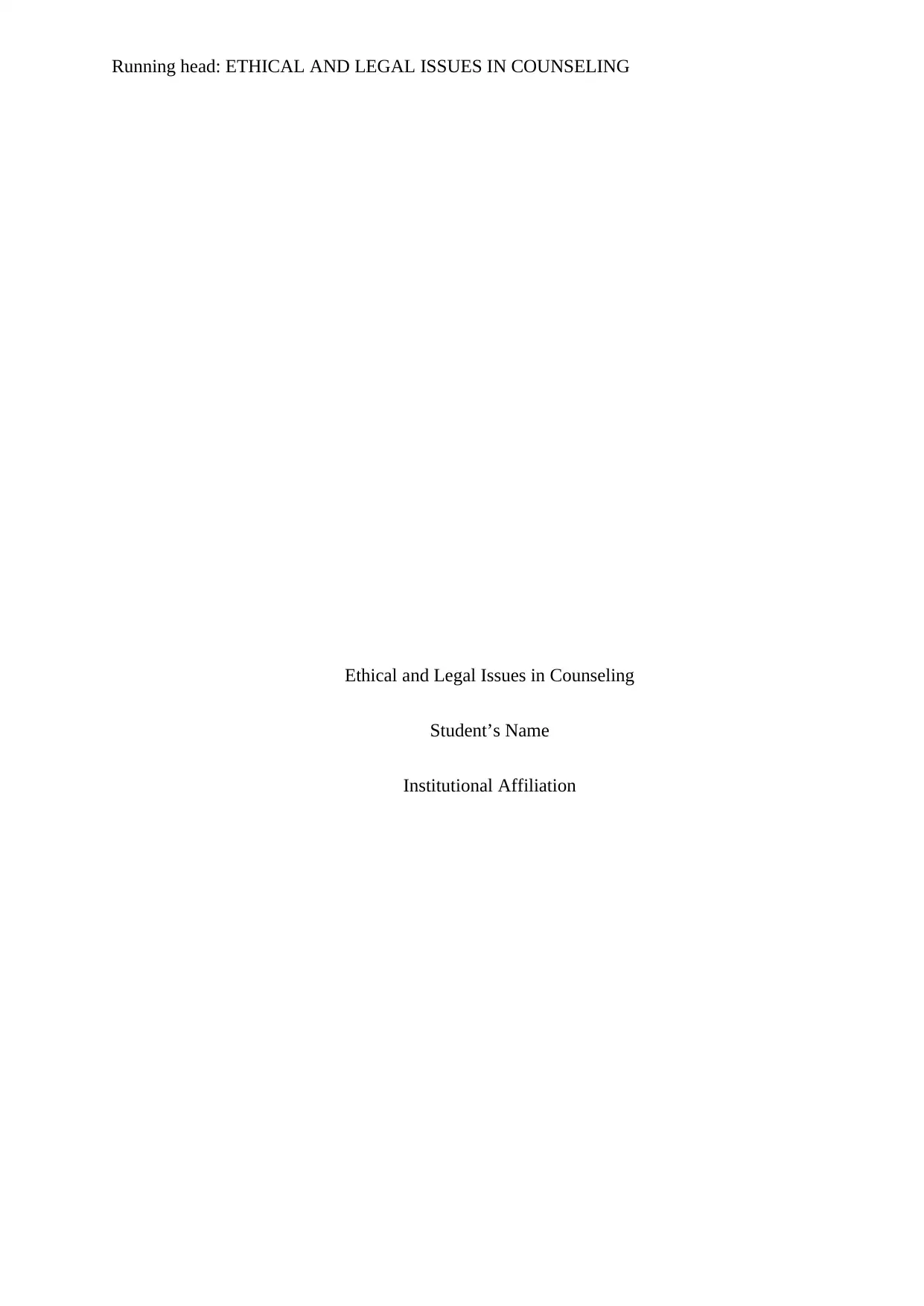
Running head: ETHICAL AND LEGAL ISSUES IN COUNSELING
Ethical and Legal Issues in Counseling
Student’s Name
Institutional Affiliation
Ethical and Legal Issues in Counseling
Student’s Name
Institutional Affiliation
Paraphrase This Document
Need a fresh take? Get an instant paraphrase of this document with our AI Paraphraser
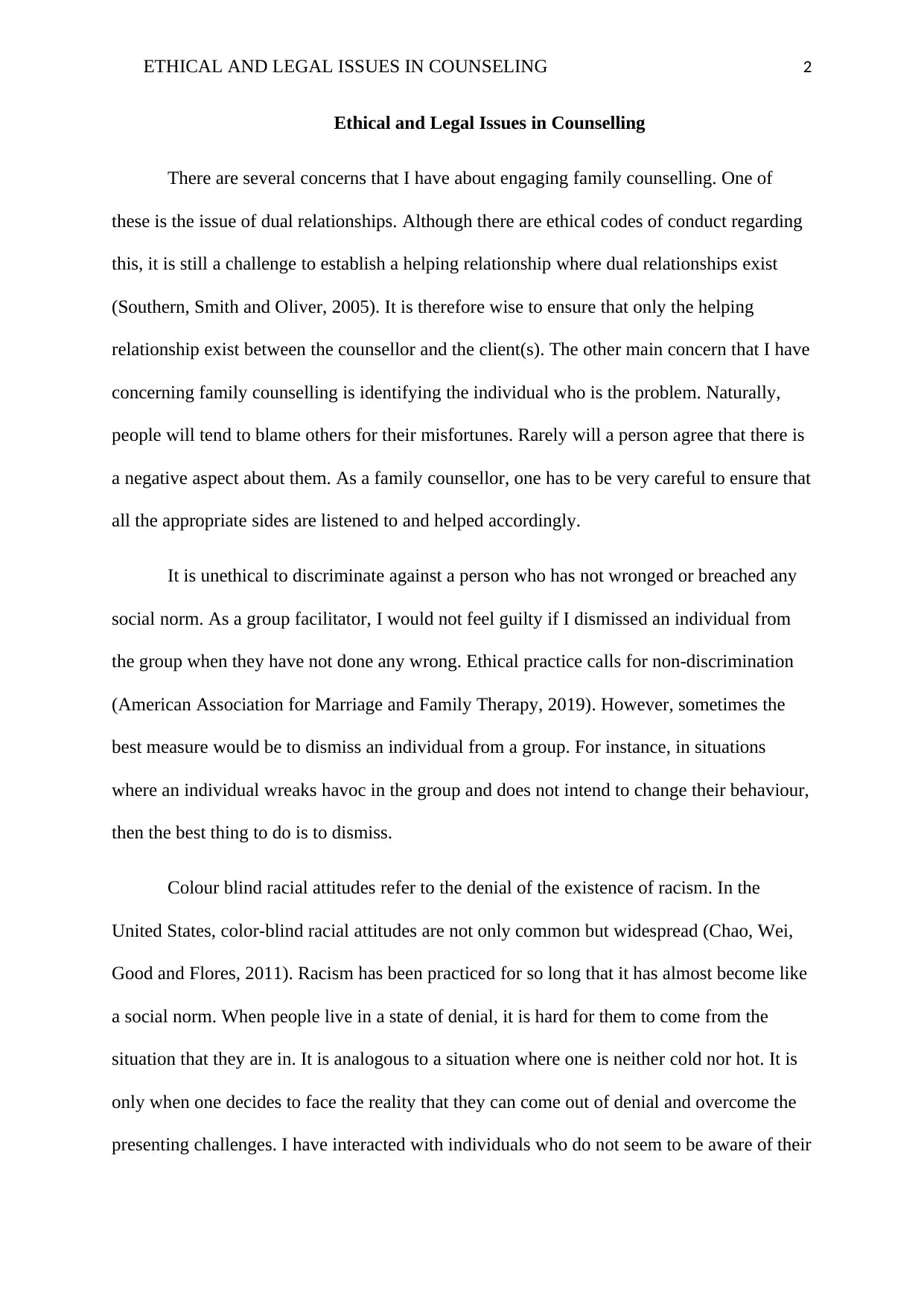
ETHICAL AND LEGAL ISSUES IN COUNSELING 2
Ethical and Legal Issues in Counselling
There are several concerns that I have about engaging family counselling. One of
these is the issue of dual relationships. Although there are ethical codes of conduct regarding
this, it is still a challenge to establish a helping relationship where dual relationships exist
(Southern, Smith and Oliver, 2005). It is therefore wise to ensure that only the helping
relationship exist between the counsellor and the client(s). The other main concern that I have
concerning family counselling is identifying the individual who is the problem. Naturally,
people will tend to blame others for their misfortunes. Rarely will a person agree that there is
a negative aspect about them. As a family counsellor, one has to be very careful to ensure that
all the appropriate sides are listened to and helped accordingly.
It is unethical to discriminate against a person who has not wronged or breached any
social norm. As a group facilitator, I would not feel guilty if I dismissed an individual from
the group when they have not done any wrong. Ethical practice calls for non-discrimination
(American Association for Marriage and Family Therapy, 2019). However, sometimes the
best measure would be to dismiss an individual from a group. For instance, in situations
where an individual wreaks havoc in the group and does not intend to change their behaviour,
then the best thing to do is to dismiss.
Colour blind racial attitudes refer to the denial of the existence of racism. In the
United States, color-blind racial attitudes are not only common but widespread (Chao, Wei,
Good and Flores, 2011). Racism has been practiced for so long that it has almost become like
a social norm. When people live in a state of denial, it is hard for them to come from the
situation that they are in. It is analogous to a situation where one is neither cold nor hot. It is
only when one decides to face the reality that they can come out of denial and overcome the
presenting challenges. I have interacted with individuals who do not seem to be aware of their
Ethical and Legal Issues in Counselling
There are several concerns that I have about engaging family counselling. One of
these is the issue of dual relationships. Although there are ethical codes of conduct regarding
this, it is still a challenge to establish a helping relationship where dual relationships exist
(Southern, Smith and Oliver, 2005). It is therefore wise to ensure that only the helping
relationship exist between the counsellor and the client(s). The other main concern that I have
concerning family counselling is identifying the individual who is the problem. Naturally,
people will tend to blame others for their misfortunes. Rarely will a person agree that there is
a negative aspect about them. As a family counsellor, one has to be very careful to ensure that
all the appropriate sides are listened to and helped accordingly.
It is unethical to discriminate against a person who has not wronged or breached any
social norm. As a group facilitator, I would not feel guilty if I dismissed an individual from
the group when they have not done any wrong. Ethical practice calls for non-discrimination
(American Association for Marriage and Family Therapy, 2019). However, sometimes the
best measure would be to dismiss an individual from a group. For instance, in situations
where an individual wreaks havoc in the group and does not intend to change their behaviour,
then the best thing to do is to dismiss.
Colour blind racial attitudes refer to the denial of the existence of racism. In the
United States, color-blind racial attitudes are not only common but widespread (Chao, Wei,
Good and Flores, 2011). Racism has been practiced for so long that it has almost become like
a social norm. When people live in a state of denial, it is hard for them to come from the
situation that they are in. It is analogous to a situation where one is neither cold nor hot. It is
only when one decides to face the reality that they can come out of denial and overcome the
presenting challenges. I have interacted with individuals who do not seem to be aware of their
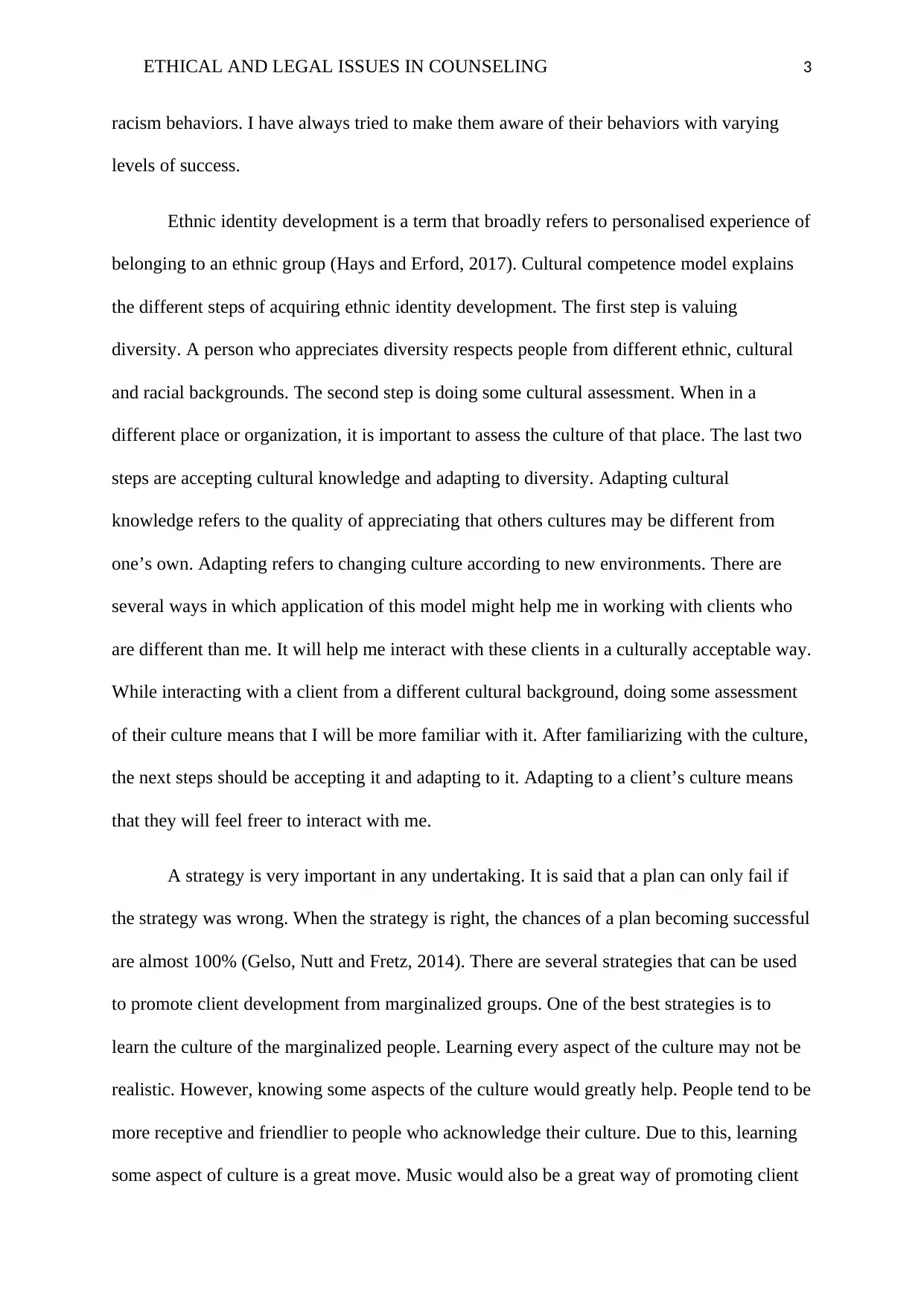
ETHICAL AND LEGAL ISSUES IN COUNSELING 3
racism behaviors. I have always tried to make them aware of their behaviors with varying
levels of success.
Ethnic identity development is a term that broadly refers to personalised experience of
belonging to an ethnic group (Hays and Erford, 2017). Cultural competence model explains
the different steps of acquiring ethnic identity development. The first step is valuing
diversity. A person who appreciates diversity respects people from different ethnic, cultural
and racial backgrounds. The second step is doing some cultural assessment. When in a
different place or organization, it is important to assess the culture of that place. The last two
steps are accepting cultural knowledge and adapting to diversity. Adapting cultural
knowledge refers to the quality of appreciating that others cultures may be different from
one’s own. Adapting refers to changing culture according to new environments. There are
several ways in which application of this model might help me in working with clients who
are different than me. It will help me interact with these clients in a culturally acceptable way.
While interacting with a client from a different cultural background, doing some assessment
of their culture means that I will be more familiar with it. After familiarizing with the culture,
the next steps should be accepting it and adapting to it. Adapting to a client’s culture means
that they will feel freer to interact with me.
A strategy is very important in any undertaking. It is said that a plan can only fail if
the strategy was wrong. When the strategy is right, the chances of a plan becoming successful
are almost 100% (Gelso, Nutt and Fretz, 2014). There are several strategies that can be used
to promote client development from marginalized groups. One of the best strategies is to
learn the culture of the marginalized people. Learning every aspect of the culture may not be
realistic. However, knowing some aspects of the culture would greatly help. People tend to be
more receptive and friendlier to people who acknowledge their culture. Due to this, learning
some aspect of culture is a great move. Music would also be a great way of promoting client
racism behaviors. I have always tried to make them aware of their behaviors with varying
levels of success.
Ethnic identity development is a term that broadly refers to personalised experience of
belonging to an ethnic group (Hays and Erford, 2017). Cultural competence model explains
the different steps of acquiring ethnic identity development. The first step is valuing
diversity. A person who appreciates diversity respects people from different ethnic, cultural
and racial backgrounds. The second step is doing some cultural assessment. When in a
different place or organization, it is important to assess the culture of that place. The last two
steps are accepting cultural knowledge and adapting to diversity. Adapting cultural
knowledge refers to the quality of appreciating that others cultures may be different from
one’s own. Adapting refers to changing culture according to new environments. There are
several ways in which application of this model might help me in working with clients who
are different than me. It will help me interact with these clients in a culturally acceptable way.
While interacting with a client from a different cultural background, doing some assessment
of their culture means that I will be more familiar with it. After familiarizing with the culture,
the next steps should be accepting it and adapting to it. Adapting to a client’s culture means
that they will feel freer to interact with me.
A strategy is very important in any undertaking. It is said that a plan can only fail if
the strategy was wrong. When the strategy is right, the chances of a plan becoming successful
are almost 100% (Gelso, Nutt and Fretz, 2014). There are several strategies that can be used
to promote client development from marginalized groups. One of the best strategies is to
learn the culture of the marginalized people. Learning every aspect of the culture may not be
realistic. However, knowing some aspects of the culture would greatly help. People tend to be
more receptive and friendlier to people who acknowledge their culture. Due to this, learning
some aspect of culture is a great move. Music would also be a great way of promoting client
⊘ This is a preview!⊘
Do you want full access?
Subscribe today to unlock all pages.

Trusted by 1+ million students worldwide
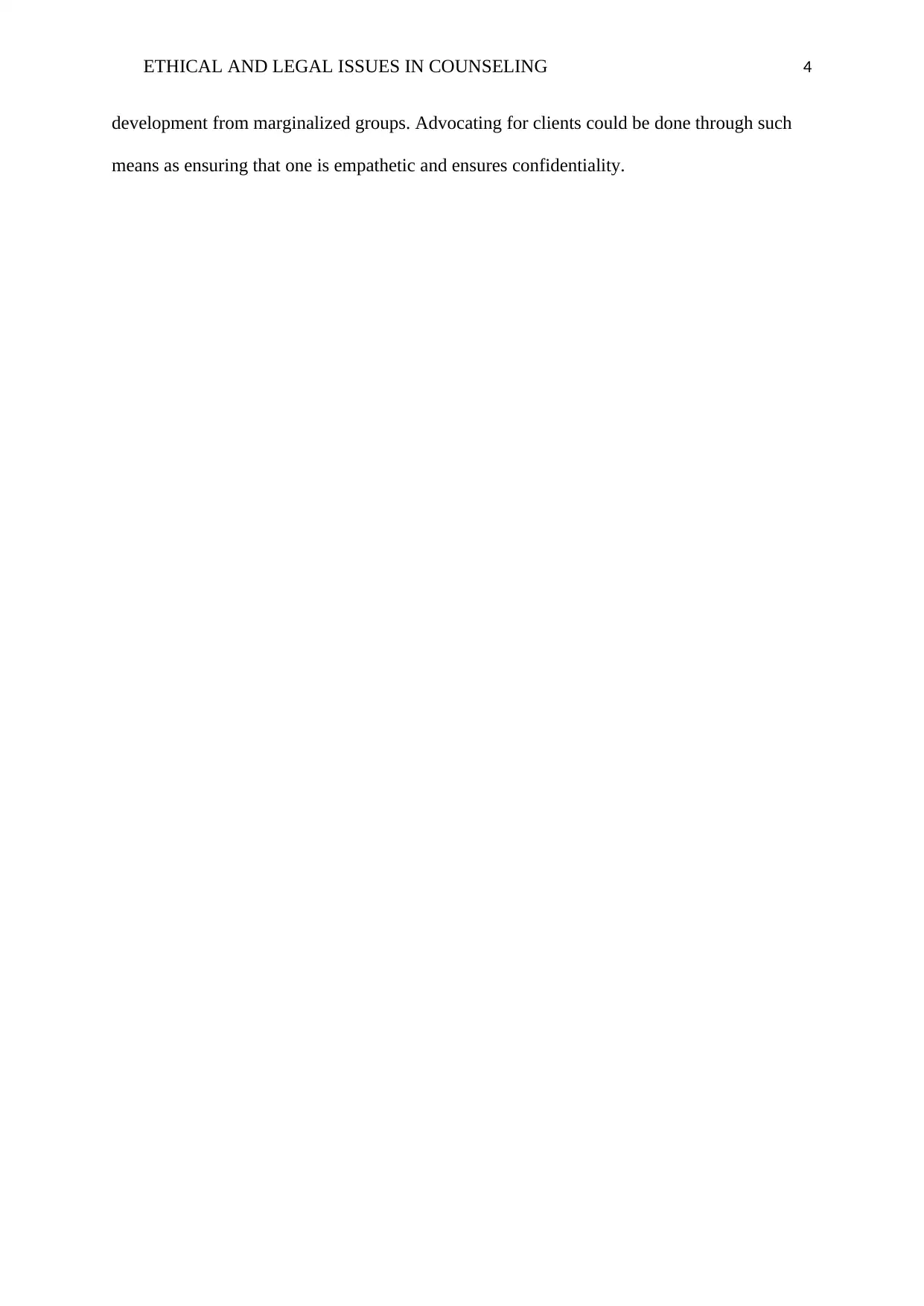
ETHICAL AND LEGAL ISSUES IN COUNSELING 4
development from marginalized groups. Advocating for clients could be done through such
means as ensuring that one is empathetic and ensures confidentiality.
development from marginalized groups. Advocating for clients could be done through such
means as ensuring that one is empathetic and ensures confidentiality.
Paraphrase This Document
Need a fresh take? Get an instant paraphrase of this document with our AI Paraphraser
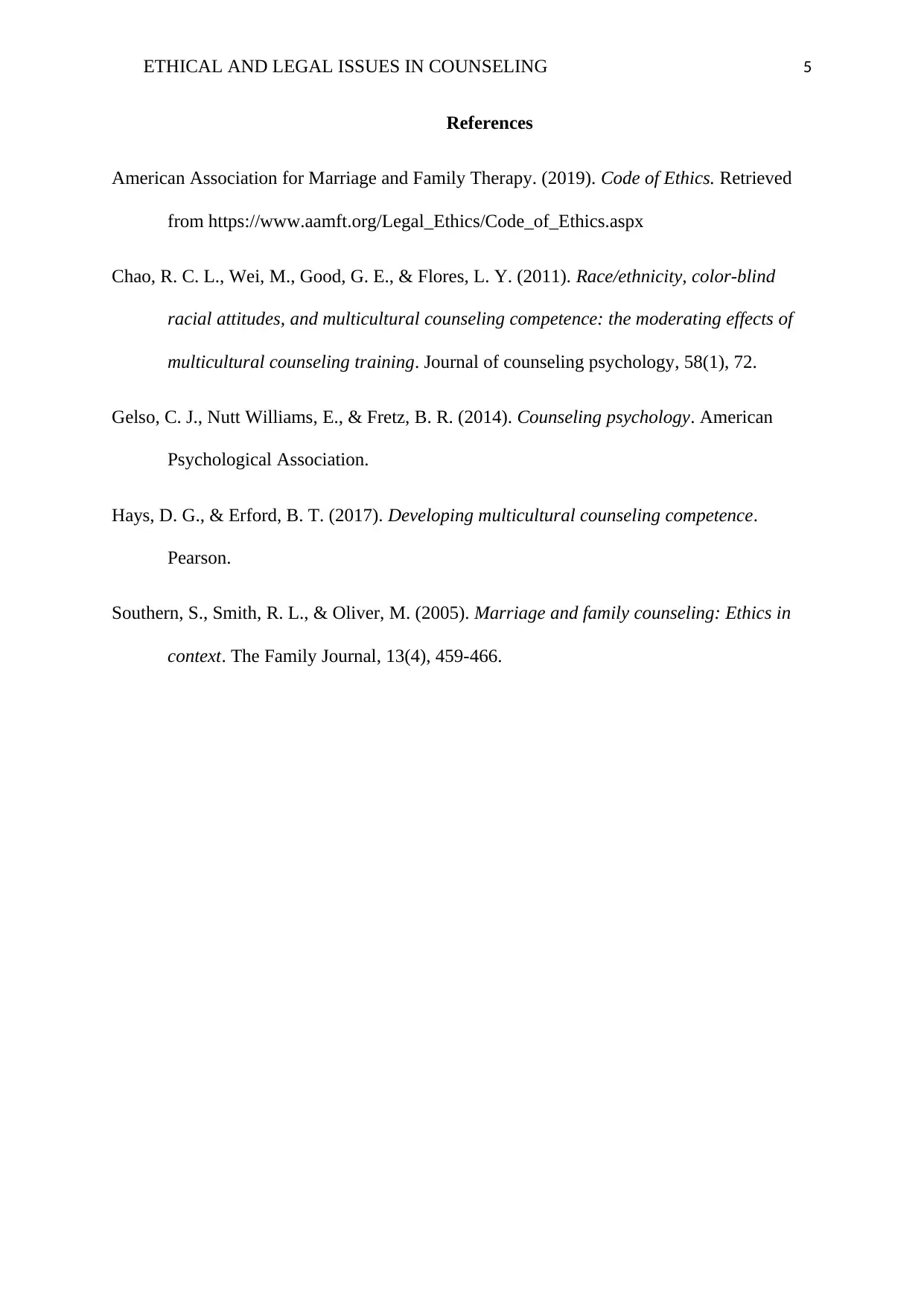
ETHICAL AND LEGAL ISSUES IN COUNSELING 5
References
American Association for Marriage and Family Therapy. (2019). Code of Ethics. Retrieved
from https://www.aamft.org/Legal_Ethics/Code_of_Ethics.aspx
Chao, R. C. L., Wei, M., Good, G. E., & Flores, L. Y. (2011). Race/ethnicity, color-blind
racial attitudes, and multicultural counseling competence: the moderating effects of
multicultural counseling training. Journal of counseling psychology, 58(1), 72.
Gelso, C. J., Nutt Williams, E., & Fretz, B. R. (2014). Counseling psychology. American
Psychological Association.
Hays, D. G., & Erford, B. T. (2017). Developing multicultural counseling competence.
Pearson.
Southern, S., Smith, R. L., & Oliver, M. (2005). Marriage and family counseling: Ethics in
context. The Family Journal, 13(4), 459-466.
References
American Association for Marriage and Family Therapy. (2019). Code of Ethics. Retrieved
from https://www.aamft.org/Legal_Ethics/Code_of_Ethics.aspx
Chao, R. C. L., Wei, M., Good, G. E., & Flores, L. Y. (2011). Race/ethnicity, color-blind
racial attitudes, and multicultural counseling competence: the moderating effects of
multicultural counseling training. Journal of counseling psychology, 58(1), 72.
Gelso, C. J., Nutt Williams, E., & Fretz, B. R. (2014). Counseling psychology. American
Psychological Association.
Hays, D. G., & Erford, B. T. (2017). Developing multicultural counseling competence.
Pearson.
Southern, S., Smith, R. L., & Oliver, M. (2005). Marriage and family counseling: Ethics in
context. The Family Journal, 13(4), 459-466.
1 out of 5
Related Documents
Your All-in-One AI-Powered Toolkit for Academic Success.
+13062052269
info@desklib.com
Available 24*7 on WhatsApp / Email
![[object Object]](/_next/static/media/star-bottom.7253800d.svg)
Unlock your academic potential
Copyright © 2020–2026 A2Z Services. All Rights Reserved. Developed and managed by ZUCOL.





